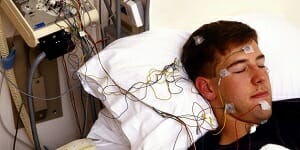How Common Is Snoring?
 When a person discovers that they snore, the first question that they are likely to ask is whether or not snoring is normal.
When a person discovers that they snore, the first question that they are likely to ask is whether or not snoring is normal.
It’s true that most people snore to some extent. While one person’s snoring may resemble a lumberjack cutting down a tree, another’s snoring may only be heard as an occasional snort or heavy breathing. The fact of the matter is that most people are not completely silent while they are asleep.
When is Snoring Abnormal?
At what point do you go from normal snoring to having a problem? There are two instances where snoring can become an issue.
The first instance is where your snoring becomes loud and intense enough to disturb your partner’s sleep. When a bed partner complains about their other half’s snoring, the snorer will often dismiss the issue and think nothing of it. The partner who has to sleep next to the snorer ends up losing sleep which can have an effect on their level of energy and mood during the day. While snoring may seem like such a harmless act, it has actually been known to cause marital issues.
The other instance is where there is a possible presence of sleep apnea. Does your partner notice that you momentarily stop breathing while asleep or gasp for air? Do you wake up with headaches or wake up tired? Do you have high blood pressure or diabetes? Do you experience difficulty trying to concentrate during the day? If you experience any of these symptoms, there is a possibility that your snoring is linked to sleep apnea which is a serious condition that can wreak havoc on your health.
What To Do When Snoring Is Abnormal
 When snoring becomes abnormal, you do have several options to correct the issue.
When snoring becomes abnormal, you do have several options to correct the issue.
Start out by thinking about the reason behind your snoring. Often times, snoring is brought upon us by lifestyle choices. For instance, if you are carrying around extra fat (particularly in the neck area) your likelihood of snoring will increase. Adopt healthier eating habits and try to shed a few pounds. In most cases, those who are overweight find that they are able to either eliminate their snoring or greatly reduce it by losing weight.
Other times, alcohol and or sedative use before bed can be blamed for a snoring problem. If you enjoy a drink or two before bed, try to limit your last drink to 4 hours before bed so that it does it does not interfere with your sleep. Alcohol relaxes the body and will cause the airway to relax which can restrict airflow and cause snoring.
You may also want to consider changing your sleeping position if you tend to sleep on your back. Sleeping on your back allows gravity to exert a force on your airway which causes snoring. Instead of sleeping on your back, try sleeping on your side. Doing so will shift airway tissue and prevent airway blockage. This practice is referred to as positional therapy.
If you are still experiencing snoring after trying these suggestions, you may want to consider the use of an oral appliance, better known as a snoring mouthpiece. Snoring mouthpieces are extremely effective and can be purchased on the internet at a cost between $60 to $100. This website contains a lot of great information and is helpful.
There are a number of other snoring aids that can assist with a snoring problem. Manufacturers of herbal remedies, throat sprays, nasal strips, chin straps, and nose cones all make promises that their products work, however, few of these products offer scientific evidence that they actually work. Oral appliance therapy, the snoring mouthpiece, has been studied and proven effective for over thirty years now.
Snoring and Sleep Apnea

A snoring problem can often be addressed by following the mentioned suggestions, but what should you do if you suspect that your snoring is related to sleep apnea? If you snore and exhibit any of the symptoms mentioned above such as pauses in breathing, daytime sleepiness, difficulty concentrating, etc., it’s absolutely necessary that you visit a physician for a further evaluation. It is likely that they will have you complete a sleep study which will measure blood-oxygen levels, brain activity, breathing, and a number of other functions while you sleep. In the past, sleep studies were only conducted in a sleep lab. Today, some doctors will prescribe an at-home sleep study which can be conducted from the comfort of your home.
What’s the difference between a lab study and an at home study? With a lab study, you will be connected to dozens of different sensors and observed throughout the night by a lab technician. The at-home version uses a far less sophisticated system which you connect up at home before going to bed. A sleep study that is conducted in a laboratory paints a much more detailed picture when it comes to determining exactly what’s going on and whether or not you are getting restful sleep at night while the at home gives a glimpse of your sleeping habits. Some physicians argue that an at home test is not adequate while others believe that it’s a low-cost screening tool that’s more comfortable and convenient for their patients. If you are interested, you can ask your physician about an at-home test although they may or may not allow one.
Snoring VS Sleep Apnea
Both snoring and sleep apnea are two issues that you will want to address. While snoring can be a nuisance that will need to eventually be addressed, sleep apnea is far more serious and can become life-threatening as the condition drastically increases your risk of stroke or heart attack. Sleep apnea cannot be self-treated while benign snoring can often be addressed with the assistance of an aid such as a snoring mouthpiece. If you question whether your snoring is related to sleep apnea, contact your physician for further screening.
Share This Post: